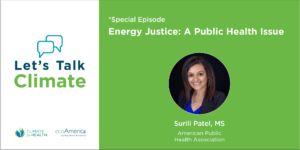Energy Justice: A Public Health Issue
On a recent Let’s Talk Climate episode, I sat down with Surili Patel from the American Public Health Association (APHA) to discuss one of their newest priorities, energy justice. As Surili reminded us, “If it’s harming people, it’s our problem. So advancing energy justice is now APHA’s business.”
Our conversation started with the definition of energy justice, which is “the principle that all people should have reliable, safe, affordable sources of energy and that it fairly disseminates the costs and the benefits of energy services, which contributes to more representative energy decision-making across the board.”
Watch the Episode Now
Energy justice is a public health issue, which is why APHA is working to elevate public health and health equity in discussions to create a cleaner energy economy. “As public health professionals and organizations, we have a responsibility to speak up for the health outcomes associated with the transition to a safer, healthier, just energy supply. And this requires a thoughtful energy transition that provides opportunities for mitigation while also promoting health equity…We are pursuing energy as a public health priority, and including health and public health up front and throughout the conversation.”
By pursuing energy justice as a priority, public health professionals can play a role in both challenging health inequities and mitigating climate change. With a strong foothold in the climate adaptation sphere, APHA is expanding its climate mitigation portfolio through energy justice. As a first step, they convened a roundtable at last year’s APHA Annual Meeting to gauge where members and partners feel APHA could make an impact in the energy justice space. From these roundtable discussions we created two factsheets to start the conversation by illuminating key concepts of energy justice and how public health professionals can advance an energy just future.
I shared my own thoughts, “Taking a public health approach really helps [us] understand how those impacts result in adverse outcomes to people and how transitioning to a clean and renewable energy economy will truly be beneficial to our health, and therefore our economy and our families.”
We talked about the ways environmental racism and the struggle for environmental justice have impacted health outcomes. “In the context of energy, race is a lead indicator for the placement of toxic facilities in the U.S….Advancing energy justice challenges these inequitable structures within the U.S. energy system.” Further, climate change is a threat multiplier and will compound the issues already baked into our systems through redlining and other discriminatory housing policies. Health equity must be centered in climate solutions, including in production of and access to energy.
To end our chat, Surili provided several concrete actions for health professionals to take:
- Use your voice to lend support for healthy energy and energy efficiency policies
- Build partnerships, especially with community-based organizations to support Black and Brown leaders in this space protecting their lands, families, and neighbors
- For those with a research background, help quantify the health benefits of a just energy system
- Vote, and help others register to vote and get to the polls
Additional Resources Discussed
APHA’s Center for Climate, Health, and Equity
Let’s Talk Climate episode, “Environmental Racism, Climate Justice, and Health”
U.S. Call to Action on Climate, Health, and Equity


About our Speaker
Surili Patel, MS, is the Director of the Center for Climate, Health and Equity and the Deputy Director of the Center for Public Health Policy at the American Public Health Association. Surili drives strategic development to bridge the gap between public health programs and sound policies. As Director of the Center for Climate, Health and Equity, Surili works to inspire action and advance policies that addresses health at the nexus of climate and equity. As Deputy Director for the Center for Public Health Policy, Surili leads the organization’s most notable environmental health programs, including water safety and security, children’s environmental health, tribal public and environmental health, environmental health messaging, transportation and health, and healthy community design. She applies her role in both Centers to champion diversity and advance health equity and environmental justice while promoting public health solutions.